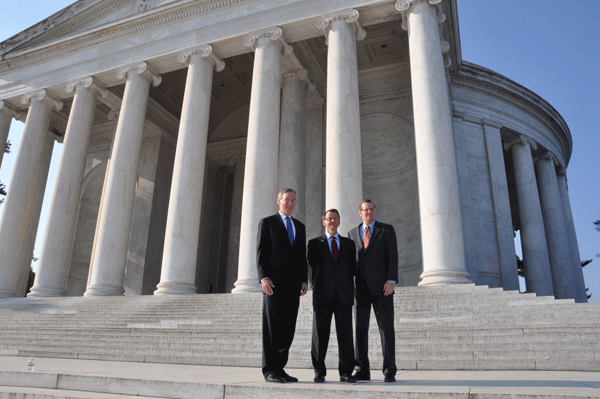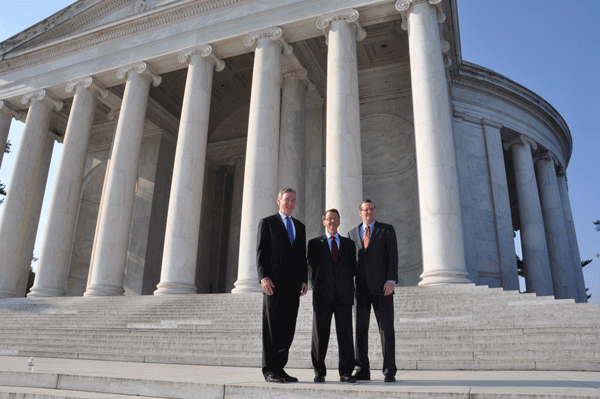
Wheaton College, an evangelical institution, filed a lawsuit against the HHS mandate today, joining Catholic University of America in opposing the rule’s coercive trampling on religious liberty. The Becket Fund for Religious Liberty is representing Wheaton College in the school’s complaint. Left to right: John Garvey, President of Catholic University of America; William P. Mumma, President of the Becket Fund for Religious Liberty; Philip Ryken, President of Wheaton College.
Wheaton College, a leading evangelical postsecondary educational institution, has joined the chorus of organizations suing the Department of Health and Human Services (HHS) over its mandate requiring nearly all insurance plans to cover abortion drugs and contraception.
“Wheaton College and other distinctively Christian institutions are faced with a clear and present threat to our religious liberty,” said Dr. Philip Ryken, president of Wheaton College, in an announcement today that the evangelical institution has joined a lawsuit with the Catholic University of America (CUA) against the anti-conscience mandate. “Our first president, the abolitionist Jonathan Blanchard, believed it was imperative to act in defense of freedom. In bringing this suit, we act in defense of freedom again.”
Wheaton College is the fourth Protestant college to file suit against the HHS mandate (and, full disclosure, this author’s alma mater). The Illinois institution joins Colorado Christian University, Geneva College, and Louisiana College. In total, more than 50 institutions are participating in more than 20 lawsuits. These plaintiffs include Catholic hospitals, religious schools serving inner city children, and ministries providing hospice care and assistance to the developmentally disabled.
The HHS mandate lawsuits take on added significance since the Supreme Court ruling in late June that allowed Obamacare to stand. The mandate goes into effect on August 1. After that, as employers renew their health plans in the coming year, they will have to comply with the HHS mandate’s coercive requirement to cover abortion drugs, contraception, and sterilization—regardless of religious or moral objections.
As Ryken noted, the narrow religious exemption included in the final rule effectively only applies to churches and will provide no protection for countless religious employers that hold moral objections to the mandated services. In the case of Wheaton, coverage of abortion drugs would violate the commitment to protecting unborn life stated in the school’s “community covenant,” which is signed by faculty, staff, and students.
Throughout the spring, the Administration touted a so-called “accommodation” to the rule for non-exempt institutions. But that accommodation is nothing more than concept and holds no force of law. Moreover, the college views the rumored accommodation as a “shell game that does not resolve the moral issue that we have,” Ryken explained today.
Damage to religious liberty remains the fundamental problem, and the HHS policy sets an alarming new precedent, as Ryken explained: “The mandate, by providing an exemption for churches, but not for other religious institutions like Christian colleges, is in effect to create two classes of religious institutions in the U.S.: those that have full protection for their religious freedom and those who don’t.”
That serious challenge explains the evangelical-Catholic alliance among the plaintiffs, as Ryken noted in a press briefing with CUA President John Garvey today:
Wheaton College is a distinctively Protestant institution, in our hiring practices, in our theology, but we have a respect for Roman Catholic institutions and, in this case, we recognize that we have common cause with the Catholic University of America and other Catholic institutions in defending religious liberty. We’re, in fact, co-belligerents in this fight against government action. I think the fact that evangelicals and Catholics are coming together on this issue ought to be a sign to all Americans that something really significant in terms of religious liberty is at stake.
All Americans benefit from religious liberty, and we should all be prepared to defend it. Today’s news of Wheaton joining the legal challenge should call attention to the seriousness of the HHS mandate’s threat to religious freedom specifically and the potential for future collisions with conscience under centralized health care policy like that embodied in Obamacare.
